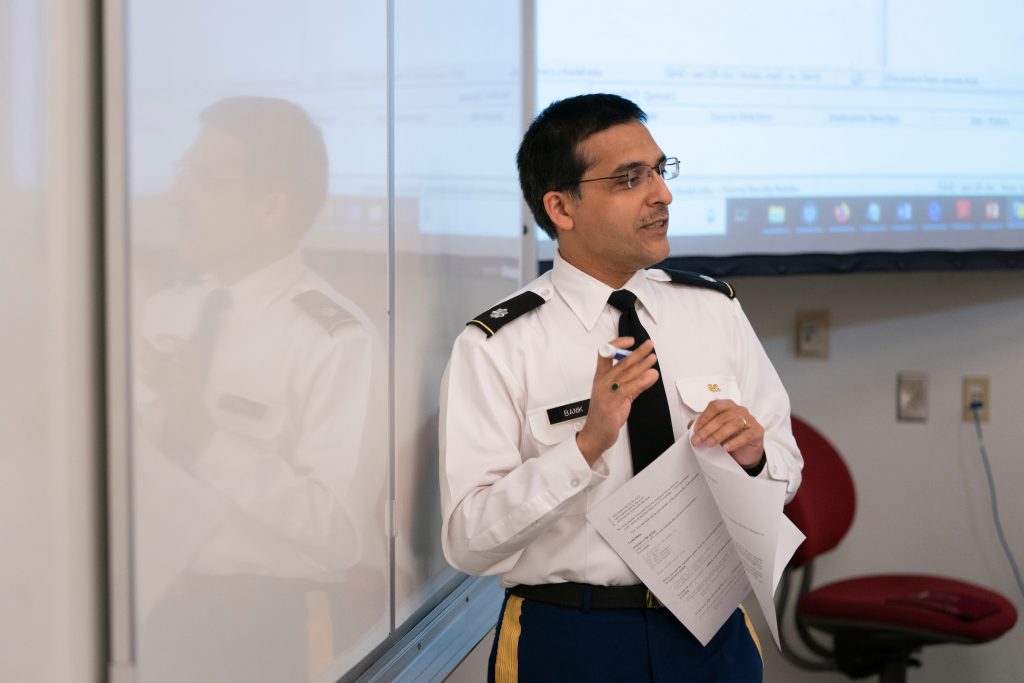
20 cadets selected annually for The Citadel Department of Defense Cyber Institute
Photo above: Former Director of National Intelligence, Dan Coats meets with cadets and students studying cyber security and intelligence at The Citadel in 2018.
The Citadel and the nation’s five other Senior Military Colleges (SMC) are all developing aligned, Department of Defense Cybersecurity Institutes, funded by the federal government. The Citadel Department of Defense Cyber Institute and the other SMC cyber institutes will address the critical national security need for a larger cybersecurity workforce.
The SMCs are federally appointed military colleges offering higher education combined with required military training in the form of Reserve Officers Training Corps Programs or ROTC. Unlike the Federal Services Academies such as the U.S. Air Force Academy, many graduates of SMCs go into military service, but it is not required. The Citadel is only one of two SMCs that continues to offer a full, 24/7 military structure for its on campus, undergraduate population.
Each of the SMCs was awarded approximately $1.5 million in 2020 to form pilot cyber institutes, intended to grow the number of highly trained cybersecurity professionals serving America. The funds, included in the 2020 Consolidated Appropriations Act, are part of a $10 million Department of Defense appropriation to the National Security Agency (NSA) for the SMC-based institutes.

“There is a critical shortage of qualified cyber professionals within the Department of Defense, both military and civilian, “said Cyber and Computer Science professor Shankar Banik, Ph.D., a co-director of The Citadel Center for Cyber, Intelligence and Security Studies. “More than 500,000 cybersecurity jobs are open nationally. The objective of The Citadel Department of Defense Institute is to provide leaders who are experts in cybersecurity and have the skills and real world experience to join the cyber workforce immediately after graduation.
Banik says within The Citadel Department of Defense Cyber Institute there is a new Cyber Leaders Development Program (CLDP). Each year, 20 cadets will be selected for CLDP and provided with stipends and specialized training. They can pursue a major in Cyber Operations, or a major in Computer Science, with a minor in Cybersecurity, or a major in Computer Science with a minor in Data Science.
“I am so pleased to partner with the Senior Military Colleges to initiate the Department of Defense Cyber Institute pilot program” said Diane M. Janosek, the commandant of NSA’s National Cryptologic School. “The Nation’s focus and investment in these six elite institutions is a key element in the expansion of the talent pipeline. These graduating cybersecurity professionals will go on to serve either on Active duty or in the National Guard or Reserves as service members in the Army, Navy, Air Force, and Marines or as Department of Defense civilians.”
Objectives of The Citadel Department of Defense Cyber Institute:
- Develop principled leaders with a cybersecurity skillset who’ll be able to join the cybersecurity workforce on “day one” after graduation
- Establish a Cyber Lab to provide the type of training required by the Department of Defense
- Organize cybersecurity summer camps for K-12 teachers and students, creating a pipeline for the cybersecurity workforce
- Develop and organize cybersecurity boot camps for the South Carolina National Guard
- Provide experiential learning opportunities to cadets through cyber competitions, internships and outreach activities
- Encourage talented students to pursue academic programs in cybersecurity, with priority given to women and underrepresented minority students to increase the diversity in the cybersecurity workforce
- Provide professional development opportunities for cyber faculty
- Create cybersecurity awareness by organizing a Cybersecurity Day in the month of October (National Cybersecurity Awareness Month).
“With The Citadel’s mission laser-focused on building principled leaders, and with the significant investment by the Department of Defense, our partnership with the other Senior Military Colleges stands to return enormous gains as we prepare the next generation of outstanding graduates skilled in executing cyber defense,” said Darin T. Zimmerman, Ph.D., dean of the Swain Family School of Science and Mathematics.
The Citadel has been designated as a National Center for Academic Excellence in Cyber Defense Education by the National Security Agency and Department of Homeland Security since 2016.

 The Citadel celebrates Cybersecurity Awareness Month with engaging campus events
The Citadel celebrates Cybersecurity Awareness Month with engaging campus events Employee of The Citadel DoD Cyber Institute selected to be deputy commanding general of U.S. Army’s Cyber Center of Excellence
Employee of The Citadel DoD Cyber Institute selected to be deputy commanding general of U.S. Army’s Cyber Center of Excellence The Citadel hosts impactful cyber camps for students, teachers and military service members
The Citadel hosts impactful cyber camps for students, teachers and military service members


